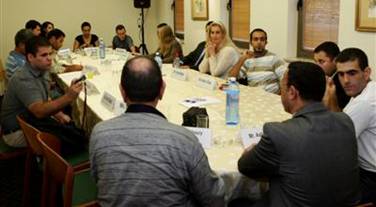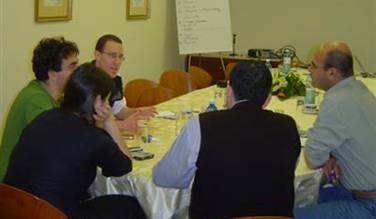In light of the urgent need to bring together emerging Palestinian and Israeli citizen-leaders, since 2004 the Peres Center for Peace has teamed up with a number of Palestinian NGOs to jointly facilitate a structured series of joint encounters and skill training called "Young Political Leaders." It is part of their priority of Civil Society Dialogue and Cooperation.
"Things do not change; we change."Henry David Thoreau, "Walden"
A Jewish and a Palestinian narrative of change:
How sustained face-to-face engagement
closes distances, opens doors
|
Tali* a 26-year-old female Israeli participant: When I was offered the opportunity to take part in a joint Israeli-Palestinian meeting, I hesitated. How could I – a woman who grew up in a right-wing home, educated to support the concept of "Greater Israel" – meet with a Palestinian? While my views have become more moderate, and I now belong to Kadima (a centrist Israeli political party), this kind of meeting still seemed radical to me. The opportunity to meet with Palestinians and discuss shared political problems, listen to their points-of-view, and for the first time, actually do it without the media's interpretation, intrigued me.
The first conversation we had was very formal and cold. It seemed like both sides were afraid to discuss the problematic issues of the conflict. I left the session with few expectations for dialogue. During the first break, while talking with a former Fatah activist turned peace activist, many arguments broke out on issues such as terrorism, the occupation, the Palestinian right-of-return, checkpoints, and anti-Israel education in the Palestinian school system. Both he and I focused on trying to prove the other wrong, rather than on trying to listen to and even understand the other. By the end of the break, I was very skeptical about the meeting's potential for success. I don't know when the shift happened, but it certainly did. If someone had been watching our group from the side, they would have been able to see how friendships started to evolve between the people. We achieved something that initially seemed impossible – we listened to one another, and in my opinion, we even tried to understand each other. Of course, we couldn't agree on everything, and one could say that we had differences of opinions on both sides (and even within the Israeli group itself), but at least there was a real attempt to understand opinions that were different from our own. During our second meeting together, in Italy, I had a very hard time – so much so that I actually wanted to leave the group… An amazing thing then happened to me – Maha was the only one who noticed what I was going through, and because of her, I stayed. She came up to me and asked me if I was okay – she noticed that I was experiencing something hard. She asked me if I wanted to talk, and as bizarre as it was to talk to her about this issue, I opened up to her and she was amazing. On the one hand, I was discussing something that made her my "enemy" but we were talking – rather, she was listening as my friend. I was scared she would be annoyed and angered by the feelings I was expressing, but she actually said she understood; that, to me, was unbelievable. A friendship was definitely born in that moment – Maha really is an amazing person. And she helped me so much. She's not just a talented person – she's one of the most talented people I have ever met, and I'm sure she'll go far… I would say that these meetings actually changed me. Today, while watching the news, I try to see the situation through two lenses – the Israeli side and the Palestinian side. There is nothing I want more than peace in Israel, but I know there is a long way to go. I believe that through these meetings, we are able to achieve small change, which begins by opening our mindsets and expanding our intellectual and emotional horizons." |

|
It wasn’t really easy to start sitting at the same table with Israelis for the first time and discuss issues of concern which were considered "red line", and to listen to the "other". The first meetings were really hard for me – just to sit there and listen. Afterward, I started to understand the position of the others and put myself in their shoes when there was a "suicide bombing" or a "terrorist attack". When we met this group in Jerusalem, I saw something in the Israelis' eyes when I started talking and started to present my points-of-view and initiate some ideas – I figured out they had some stereotypes about Palestinians in general, and Palestinian women in particular… During the break, we had a discussion to introduce ourselves more thoroughly. They asked me where I got my English and where I studied – I told them I'm from a refugee family, my parents are not highly educated, and we are considered middle class. The ["Young Political Leaders"] program – attending the workshops and all the meetings – was an opportunity by itself to do some research. For me, this was the first step toward enhancing my knowledge. The second one was the one-on-one discussions with the Israelis and seeing how my counterparts think of things – their analysis of the Palestinian cause, and the Palestinian-Israeli conflict. I learned a lot – you talk about Kadima and then you (meet with) representatives of the party, so you learn a lot about Israeli politics. And by discussing things – formally around the discussion table or informally – I learned a lot. On a personal level, I believe that I made good friendships with them (the Israelis). When we went to Italy (for a "Young Political Leaders" workshop), I got to know them better – especially Tali. I believe we have much in common on a personal level – women, fashion, men. I believe if I got the chance to go to Israel, I think both of us could be close friends.
Importantly, I learned how to listen. At the beginning, when I started with the group, I was very reactive. Now, I have learned how to listen, to understand the other, and then to present my point-of-view in a way that shouldn’t offend others. So when I heard (Tali), I understood it was her first time meeting Palestinians. She wanted to present that they (Israelis) are right, we (Palestinians) are wrong. So I tried to understand and listen – even though it wasn’t really an easy thing to do – I felt offended sometimes, when it comes to rights and international law and accusing Palestinians of being terrorists and having this stereotype. It wasn’t easy, but I tried to understand and talk objectively. Actually, she approached me, I was surprised. How come she approached me? Being from a conservative family and very right-wing – how did she approach me? When she talked to me, I was really impressed – she's very knowledgeable and has a good position in Kadima. She is an activist, and I really admire her. By looking at her, the way she talks about things and discusses things, I believe that someday, she will be somebody important in Israeli politics." |
*Names
have been changed to protect the privacy of the participants.
January, 2008

